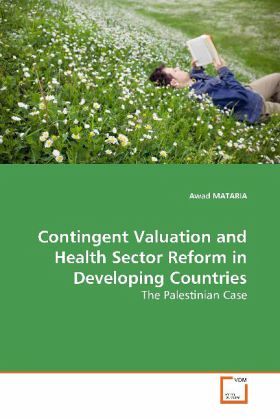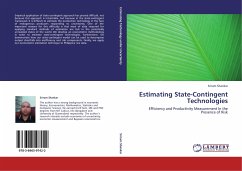
Contingent Valuation and Health Sector Reform in Developing Countries
The Palestinian Case
Versandkostenfrei!
Versandfertig in 6-10 Tagen
39,99 €
inkl. MwSt.

PAYBACK Punkte
20 °P sammeln!
This Thesis aims to help establish a complementary funding mechanism for health services in the context of the current socioeconomic crisis in the emerging Palestinian State. It focuses on the design ofan efficient and equitable cost-recovery mechanism for primary health care services, based on the value of improving the quality of care from the patients perspective. The study makes use of the contingentvaluation method to assess the value, for the patients, of improving the quality of care, by eliciting patients willingness to pay values for different quality improvements. A contingent valuat...
This Thesis aims to help establish a complementary
funding mechanism for health services in the context
of the current socioeconomic crisis in the emerging
Palestinian State. It focuses on the design of
an efficient and equitable cost-recovery mechanism
for primary health care services, based on the value
of improving the quality of care from the patients
perspective. The study makes use of the contingent
valuation method to assess the value, for the
patients, of improving the quality of care, by
eliciting patients willingness to pay values for
different quality improvements. A contingent
valuation questionnaire was designed based on a
decomposed valuation scenario and the payment card
elicitation technique, with user-based financial
contributions at the point of consumption being the
payment vehicle. The elicited values were used to
inform decision-makers about the highest
extra user fee patients would be willing to pay to
benefit from specified improvements in the
quality of care.
funding mechanism for health services in the context
of the current socioeconomic crisis in the emerging
Palestinian State. It focuses on the design of
an efficient and equitable cost-recovery mechanism
for primary health care services, based on the value
of improving the quality of care from the patients
perspective. The study makes use of the contingent
valuation method to assess the value, for the
patients, of improving the quality of care, by
eliciting patients willingness to pay values for
different quality improvements. A contingent
valuation questionnaire was designed based on a
decomposed valuation scenario and the payment card
elicitation technique, with user-based financial
contributions at the point of consumption being the
payment vehicle. The elicited values were used to
inform decision-makers about the highest
extra user fee patients would be willing to pay to
benefit from specified improvements in the
quality of care.












